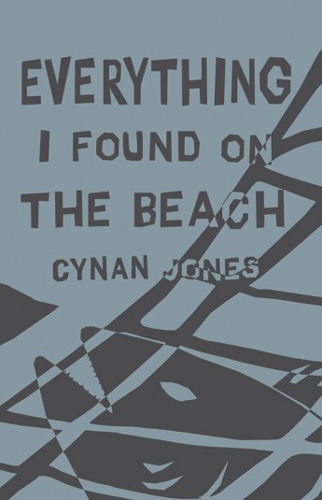Everything I Found on the Beach
Everything I Found on the Beach, by Cynan Jones, begins with police finding a mutilated body on a Welsh beach. What comes next is an unnamed woman opening an envelope, the contents of which fill her with high emotion. I could hardly wait to find out whose body it is and what’s up with the woman.
Everything I Found on the Beach, by Cynan Jones, begins with police finding a mutilated body on a Welsh beach. What comes next is an unnamed woman opening an envelope, the contents of which fill her with high emotion. I could hardly wait to find out whose body it is and what’s up with the woman.
The novel, released by Coffee House Press this year, was first published in 2011 in Great Britain. Jones has published three other short novels, won a number of awards, and has worked extensively with writing projects in schools. He’ll be the Royal Literary Fund Fellow at Aberystwyth University in September, and his next book, Cove, will be published this fall.
In Everything I Found on the Beach, two men, Holden and Grzegorz, dominate the story. Jones toggles back and forth between them, giving us their personalities, problems, and hopes for the future. Holden, called Hold throughout most of the book, actually carries the story, though I was more intrigued by Grzegorz, who moved his wife and two children from Poland to Wales, and now works a miserable job in a slaughter house:
[ . . . ] the side door of the pen slid up and the animal fell on its side and rolled out onto the counter in front of him.
“I can’t do this,” thought Grzegorz. “I don’t know how much longer I can do this. [ . . . ]”
His repulsion leads him to a shady opportunity in hopes it will bring a brighter future for his family.
Hold is a fisherman who looks after his deceased friend Danny’s widow Cara and her child Jake. Danny died, leaving Cara without means: “Danny had never considered that things could go wrong, turn for the worst. Or if he had, he buried his head from them. It was what was engaging about him, but it worked only with the balancing responsibility Hold took.”
Once I read about the body on the shore, I expected to be propelled into the action. But first I had to wade through a whole lot of fishing, fish gutting, and fish eating. This book is predominantly narration with very little dialogue, and Jones’s lengthy passages slowed the story for me. He relies heavily on the word and. For example, page after page is devoted to Hold getting ready to shoot rabbits:
He took out the gun and checked it rhythmically again and checked the barrel and screwed on the silencer and rested it against the stile and folded up the gun bag and pushed it into the game bag and clipped up the straps.
Another several pages are devoted to gutting three rabbits he finally shot.
But then, a third of the way into the book, the narrative sparks to life. Holden spots an inflatable “spinning slowly by the rocks. [ . . . ] He saw a flash of engine, some red perhaps as the boat swung. And then a heap. A dark mass in the belly of the boat and he knew immediately it was a man.”
“Hold grabbed the collar and pulled the man and sat him up and the head came up and sat itself up as if against a pillow and it was like the broken neck of a bird.”
Holden sees three small packages in the boat: “He had no idea what it was. But he knew it was drugs, and it looked raw and unprocessed and he wouldn’t be able to tell you what part of his knowledge told him this.” [ . . . ] “He thought of the pointless death of the man and of the boat being delivered up to him on the beach and thought vaguely that the death would take on purpose if it was to secure things for Cara and Jake.”
Holden hides the drugs ingeniously, and his thoughts waver among tossing the drugs, dealing them himself, or doing business with an Irish gangster named Stringer. Hold’s fear of what could happen to him following his decision moves the story swiftly toward its climax. He talks aloud to himself:
“There’s a way out,” he said. “I don’t need the money. It’s not worth the risk. And I don’t want these any more, it’s like they’ve become some part of me.” It was as if the drugs had some voice to him now, as if they had taken on a little song. “It’s closing around me,” he thought.
In Everything I Found on the Beach you’ll find a story that takes some sticking to it. The long descriptive passages are relieved with action, and the ending is quite dramatic. The novel as a whole illuminates the inner, fragile struggles of men and the dangerous visible struggles that result when certain paths are chosen. Perhaps there are lessons to be learned from it.





